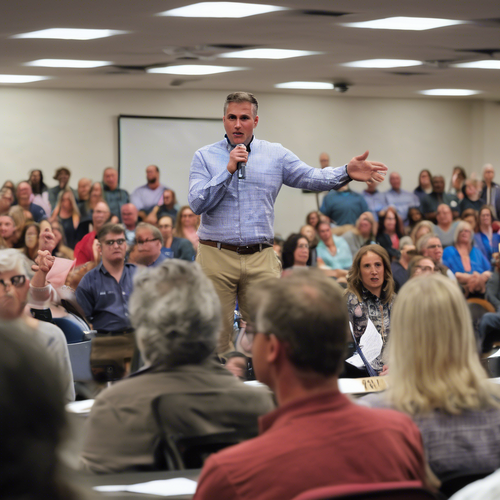Texas District 18 Candidate Rejects Calls for Congressional Redistricting 🗳️🚫
In a political climate riddled with the complexities of representation and the art of gerrymandering, the stance of a Texas District 18 candidate against the call for congressional redistricting feels almost ironic. Here lies a candidate wearing the badge of democracy, yet signaling a preference for a system that some critics claim suffocates true representation. How does one reconcile these contradictions without becoming entangled in the web of political irony?
As the sun rises on another election season, the battle lines draw sharper in District 18. The whispers of discontent grow louder, reflecting a palpable tension between the electorate’s demand for change and the incumbent’s reluctance to disrupt the status quo. Is this a defense of local interests, or a veiled admission of fear for what a redistricting could unleash? The delicacies of political strategy unfold much like a Wagnerian opera: full of drama, conflict, and—ironically—a struggle for harmony.
The Landscape of District 18: A Tale of Two Communities
This district, akin to a tapestry woven with varying hues, encapsulates communities that are often at loggerheads regarding political representation. On one side, suburban enclaves blooming with young families; on the other, established neighborhoods steeped in conservative tradition. The contrasts are striking—and they illuminate the candidate’s challenge.
The candidate’s opposition to redistricting plays into a defense of these communities, arguing that again, a shift might dilute the voice of his constituents. But is this a noble stand or merely self-preservation? After all, the winds of change often carry with them the scent of opportunity—much like the fragrant, yet fleeting blossoms of spring.
An Argument of Practicality or the Politics of Fear?
Redistricting, at its core, is meant to address the evolving demographics and ensure fair representation. Yet, in the hands of those wary of losing ground, it becomes a double-edged sword. The current candidate’s narrative—no redistricting means maintaining power—sparkles with just enough political irony to prompt head-scratching. 🤔 If the system indeed benefits only a select few, should it remain intact?
The statistics back up the implications of redistricting: areas could vastly reshape electoral landscapes, potentially enhancing voter representation among underrepresented groups. Wouldn’t that be a win-win? Yet, here lies the antithesis: a candidate emblematically resisting change while advocating for their own political longevity.
Community Voices: The Call for Change
Residents aren’t shy about voicing their opinions. “It’s like trying to fit a circle into a square,” says Maria Lopez, a local activist, who argues that a new map could illuminate the darker undercurrents of political exclusion faced by minority voters. “More voices in the mix mean better representation for all.” She emphasizes that although some resist, the populace is crumbling under the weight of a political apathy perpetuated by stagnant practices.
Soaring costs and essential services hang in the balance, raising questions like leaves shaken from a tree: Who truly benefits from the current lines drawn on a map? Citizens crave a system vibrant with choice—unlike a dusty relic that no longer serves the community’s heartbeat.
- 65% of district voters believe that redistricting could enhance representation.
- 72% express concerns over voter apathy linked to stagnant political practices.
A Broader Reflection on Political Clout
The candidate’s fear of losing influence overstays its welcome as the fundamental question looms: Is true representation sacrificed at the altar of incumbency? The irony is almost poetic when one considers how historical power struggles echo the narrative of newly awakened voters yearning for acknowledgment.
Every election year mirrors the bloom of a wildflower, promising fresh hopes, fears, and alliances. Positioning against congressional redistricting might nurture the candidate’s current political roots, but the frost of discontent could settle uneasily if change does not come. A paradox emerges: in desiring to hold on, one risks losing it all. 🌱
The Road Ahead: A Call to Action
As voters gear up for what promises to be a tumultuous election season, one can’t help but ponder the implications of this candidate’s stance. Will the residents of Texas District 18 endure yet another election cycle under the weight of outdated boundaries? Or will they rise to embrace a future rich in diversity and representation, demanding their voices—like rivers meeting the ocean—clear and unblemished?
In the face of this crucial juncture, the question arises: Can we afford to let irony dictate our political futures? ⚖️ The winds of change are blowing; will Texas District 18 stand firm, or will it sail, unshackled, into uncharted waters of hope and equity?





